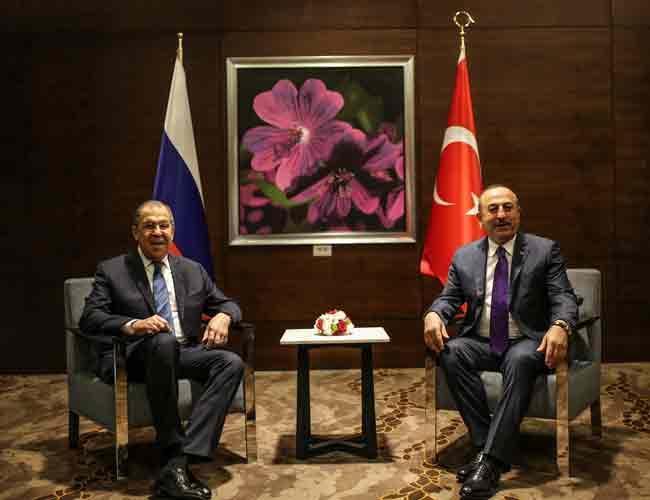
Foreign Minister Mevlüt Çavuşoğlu on March 29 said an agreement for the procurement of the Russian S-400 air defense system is a “done deal” and refuted claims that Turkey might ship the system to a third country in a bid to avoid United States’ sanctions.
“We have sealed an agreement with the Russian Federation and we are committed to this deal,” Çavuşoğlu told reporters after a meeting with his Russian counterpart Sergey Lavrov in Antalya.
The two ministers met in the Turkish minister’s hometown to coordinate the future talks between the two countries, particularly on Syria and the sale of the S-400 anti-missile system. The U.S. strongly opposes Turkey’s decision to deploy the system on the grounds that it would endanger the safety of other NATO equipment, particularly the new generation F-35 aircrafts. Turkey is also a part of the F-35 project and expecting the deployment of the first two aircrafts by this fall.
“We have signed a deal with Russia. Now we are discussing certain expectations on when the delivery will happen or what can we do. This deal is made before a CAATSA decision,” he said, referring to the Countering America’s Adversaries Through Sanctions Act approved in mid-2017.
“Nevertheless, it is against international law that a third country opposes a deal between two countries. The whole world should see that ‘This is what I want so it should happen’ mentality is no longer valid,” he said.
Turkey has no intention of selling the S-400s to another country, Çavuşoğlu also said. “We made this deal with the Russian Federation and are committed to it. There is no such thing as giving or selling it to another country. We purchased these for our own needs. Russia can sell these to a third country if it wishes. It can discuss it with them. Why would I give what I purchase to another country?” he said.
‘Contradictory messages from US’
The minister’s remarks came after a question regarding recent media reports that Ankara considers selling its S-400 systems to a third country, to circumvent possible US sanctions.
Turkey has been receiving contradictory statements from the U.S., the minister said, adding Ankara has met all its obligations related to the F-35s, which are made by Lockheed Martin Corp, and changing their mind in the middle of the process is not in line with laws.
Turkey is a production partner in the trillion-dollar F-35 fighter jet program but the United States, a NATO ally, has opposed its purchase of Russian systems which could compromise the security of the aircraft.
His remarks came after a preparatory meeting with the Russian delegation for the High-Level Cooperation Council meeting which will be held in April and attended by the presidents.
Visa-free travel to Russia is high on Turkey’s agenda
The two ministers signed the 2019-2020 Plan for Consultations. The plan outlines cooperation road map for the two countries in the upcoming two years, including consultation topics such as Balkans, Latin America and Central Asia, a Turkish diplomat told Hürriyet Daily News on condition of anonymity.
One of the high profile topics of the meeting was bilateral visa regime of Turkey and Russia. Çavuşoğlu once more reiterated Ankara expects Russia to allow vise free travel of Turkish citizens Russia, a practice suspended after 2015.
“Our expectation is the complete removal of visa for our citizens. We discussed which steps we can take regarding this, and also we will together continue to work on this issue,” Çavuşoğlu said.
Lavrov, for his part, said they have discussed upcoming steps on the issue.
Russian President Vladimir Putin signed a decree to lift visa requirements for Turkish businessmen and truck drivers traveling to Russia. Çavuşoğlu last week said the two countries were in talks to allow Russian nationals to travel to Turkey without a passport.
List for constitutional committee will be submitted to UN soon
The two ministers also discussed regional issues as well. They both criticized the U.S. decision on Golan Heights, saying it was against international law.
Asked about the efforts to form a constitutional committee for Syria, which was in deadlock due to a list of committee members proposed by the regime but objected by the opposition, Lavrov said the names are gaining certainty and will be delivered to the U.N. special representatives soon.
Lavrov also said it is essential to restore the situation on the eastern bank of the Euphrates River that existed prior to the United States’ deployment in the region. Elaborating on a possible safe zone in northeastern Syria discussed among U.S.-led coalition members, Lavrov said such a move should respect both Syria’s territorial integrity and Turkey’s security concerns.
Safe zone is not threat to Syria’s future
Çavuşoğlu reminded that Turkey coordinates with Russia on the issue of talks with the U.S. regarding a safe zone and stressed the U.S. objects the regime deployment after its withdrawal. “The U.S. says they will not withdraw if the regime would return there,” he said. The U.S. is concerned that Iran could take the advantage to fill the vacuum here if the regime enters the northern Syria after U.S. withdrawal, a Turkish official told the Daily News.
In reply to Russia’s rhetoric for maintaining Syria’s territorial integrity, the Turkish minister said the idea of establishing a safe zone in northern Syria near Turkish border is crucial for Turkey’s security and this temporary measure would not threaten future of the neighboring country.
“The U.S. withdrawal is important for the region. The idea of safe zone, Turkey’s security is very important. If there is no safe zone in this area, a different chaos will come out if it gets into the hands of the regime. Temporary measures will not, should not threaten the future of Syria,” Çavuşoğlu said.